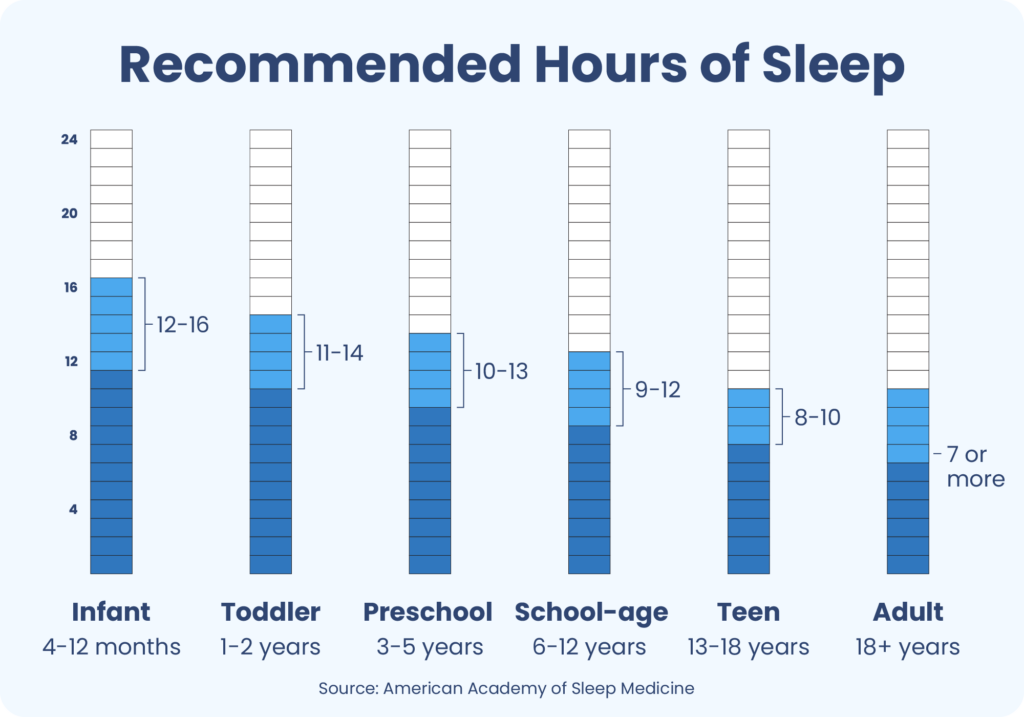A Full Breakdown of Healthy Sleep Ranges at Every Age
Getting the right amount of sleep is essential for maintaining good health and overall well-being. Sleep needs vary significantly by age, and understanding these requirements can help you establish better sleep habits for yourself and your loved ones. Here’s a detailed breakdown of recommended sleep ranges for different age groups, including an FAQ section, reference list, and a table summarizing data points for clarity.
Why Sleep Needs Change Over Time
Sleep plays a vital role in physical and mental development, energy restoration, and cognitive functioning. As we age, the body’s demands and sleep patterns evolve due to changes in hormonal activity, lifestyle, and overall health. For example, newborns require more sleep for brain and body development, while adults need sleep to maintain energy levels and repair tissues.
Sleep Recommendations by Age Group
The National Sleep Foundation and other health organizations have established the following sleep guidelines for different age ranges:
| Age Group | Recommended Sleep Range | Key Notes |
|---|---|---|
| Newborns (0-3 months) | 14-17 hours per day | Critical for brain and physical development. |
| Infants (4-11 months) | 12-15 hours per day | Naps are a major component of total sleep. |
| Toddlers (1-2 years) | 11-14 hours per day | Routine is essential for consistent sleep. |
| Preschoolers (3-5 years) | 10-13 hours per day | Bedtime routines aid in sleep transition. |
| School-Age Children (6-13 years) | 9-11 hours per day | Supports learning and memory consolidation. |
| Teenagers (14-17 years) | 8-10 hours per day | Biological changes can delay sleep onset. |
| Young Adults (18-25 years) | 7-9 hours per day | Balancing work, study, and rest is crucial. |
| Adults (26-64 years) | 7-9 hours per day | Maintaining good sleep hygiene is vital. |
| Older Adults (65+ years) | 7-8 hours per day | Sleep disorders become more prevalent. |

The Importance of Sleep Quality
In addition to meeting the recommended hours of sleep, the quality of sleep is just as important. Poor sleep quality can lead to:
- Daytime fatigue
- Impaired cognitive function
- Increased risk of chronic illnesses like diabetes and cardiovascular disease
Good sleep quality involves uninterrupted sleep cycles, restorative deep sleep, and waking up feeling refreshed.
Tips for Meeting Sleep Requirements at Any Age
- Newborns and Infants: Establish a consistent bedtime routine and provide a safe sleep environment.
- Children and Teens: Limit screen time before bed and encourage physical activity during the day.
- Adults and Seniors: Maintain a regular sleep schedule, manage stress through relaxation techniques, and create a sleep-conducive environment.
FAQs About Sleep Ranges
Q1: Why do newborns sleep so much? Newborns require extensive sleep to support rapid brain development and physical growth. Their sleep patterns are often irregular as they adapt to the circadian rhythm.
Q2: Is it normal for teenagers to stay up late? Yes, teenagers experience a biological shift in their sleep-wake cycle, often causing them to stay up later. However, they should still aim for 8-10 hours of sleep to ensure optimal health and performance.
Q3: Can adults function well on less than 7 hours of sleep? While some adults claim to function on less sleep, chronic sleep deprivation can lead to long-term health issues, including cardiovascular disease and impaired cognitive abilities.
Q4: How can seniors improve their sleep quality? Older adults can improve sleep by addressing underlying health issues, maintaining a consistent sleep schedule, and creating a comfortable sleep environment.
Q5: What happens if you consistently don’t get enough sleep? Chronic sleep deprivation can lead to serious health issues such as obesity, diabetes, cardiovascular disease, and mental health disorders.
References
- Hirshkowitz M, et al. National Sleep Foundation’s sleep time duration recommendations: methodology and results summary. Sleep Health. 2015;1(1):40-43. doi: 10.1016/j.jfsh.2014.12.010.
- Watson NF, et al. Recommended Amount of Sleep for a Healthy Adult: A Joint Consensus Statement. Sleep. 2015;38(6):843-844. doi: 10.5665/sleep.4716.
- National Institutes of Health. Sleep Deprivation and Deficiency. https://www.nhlbi.nih.gov/health-topics/sleep-deprivation-and-deficiency. Accessed January 2025.
- National Sleep Foundation. Sleep Guidelines by Age. https://www.sleepfoundation.org/how-sleep-works/how-much-sleep-do-we-really-need. Accessed January 2025.
Conclusion
Understanding and meeting age-appropriate sleep requirements is key to fostering physical health, emotional resilience, and overall well-being. By prioritizing sleep and maintaining good sleep hygiene, you can ensure better health outcomes for every stage of life. Use the table as a quick reference to identify your sleep needs and make adjustments for a healthier lifestyle.


